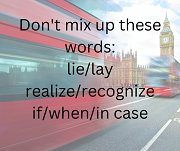Verwechslungsgefahr
Unserer Erfahrung nach gibt es verschiedene englische Wörter, die man leicht verwechselt. Lernen Sie Vokabular immer im Zusammenhang und mit Beispielsätzen, die Ihnen die Anwendung im Kontext deutlich machen. Ihr Trainer wird Sie auf solche typischen Fehler im Englischunterricht hinweisen.
Recognize/realize
She ran into Tim downtown and didn’t recognize him — he looked completely different.
He only realized it was her when she started talking to him.
She recognized the fear in her voice.
lie/lay
She had to go and lie down — She has a headache.
I wanna lay you down on a bed of roses (Bon Jovi).
Can you help me lay the table? She laid the table before her mother could ask her (past tense of lay is laid).
I like lying on the beach. She lay down at 2pm because I was so tired (past tense of lie is lay).
If/when
If you come home, bring some milk! Ouch!!!
Unfortunately mixing up “if” and “when” can lead to some absurd scenarios.
In this case the question that comes up is: Will the partner/significant other /spouse ever come home?
Or will they choose to stay away, never to return again?
If und when nicht verwechseln
“If” means that a condition needs to be fulfilled.
If I won the lottery, I would move to California immediately (but chances are low).
If they decide to expand to Italy, I will put myself forward as the new country sales manager because I speak fluent Italian.
But they are not sure if Italy is a good opportunity.
“When” on the other hand means “at a time when”.
We will eat when she gets home.
When they lived in Spain, they didn’t write to us very often.
When you are ready, let me know and I’ll call a taxi. (same sense as „as soon as“)
Hier ein paar Beispiele für falsche Anwendung
If I die, I want to be cremated.
When I go now, I will still catch the bus.
If I was a child, I was always very lively.
If I was young, I never needed anyone.
When you want, I can help you.
Und hier noch etwas, das viele Lernende mit mittleren Kenntnissen nicht wissen:
in case für den Fall dass
Take an umbrella in case it rains.
“in case” means “für den Fall, dass“ (Du nimmst den Schirm auf jeden Fall. Es könnte ja regnen).
Eine ganz andere Bedeutung als “I‘ll take an umbrella if it rains” (in diesem Fall schaust Du erst aus dem Fenster und nimmst dann den Schirm mit)

